COVID-19: Resilience at Work
September 2021
Generous benefactors contributed to those in need and enabled us to quickly pivot and respond to the immediate needs of Coloradans. Thanks to community support, our campus served as a beacon of hope and trusted expertise; we educated the public on the virus, shared data with state officials, provided exceptional patient care at our hospitals and administered the vaccine into as many arms as possible.

Thinking back to our campus’ initial response to the pandemic, I think we made an extraordinary contribution to health and well-being in the state whether it was clinical care, strategizing or the work that we did at the Colorado School of Public Health to advise the Colorado Department of Public Health & Environment and Colorado Gov. Jared Polis to show where the pandemic was at particular moments and where it might go. That work was invaluable in setting the policy agenda."
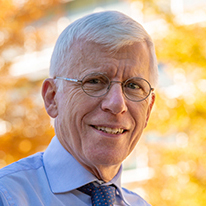
Jonathan Samet
MD, MS, Dean of the Colorado School of Public HealthThe progress made in fighting this pandemic was accomplished through our research experts, healthcare providers, frontline workers and community support. Cross-campus collaboration from our colleagues in the Skaggs School of Pharmacy, College of Nursing, School of Medicine, Colorado School of Public Health (ColoradoSPH), School of Dental Medicine and our hospital partners were unmatched.
Jonathan Samet, MD, MS, dean of ColoradoSPH, led the charge in conferring with Gov. Polis’ office to educate state officials on our virus research and vaccine distribution efforts. A team was assembled by ColoradoSPH to collaborate with the Colorado Department of Public Health & Environment (CDPHE) on epidemic modeling to generate information for quick decision-making. As a result, our COVID data was used in every single update from the state. Even with constantly changing information, we were able to share vital COVID data with the community directly from our experts in real time, as our models were updated weekly to show what could happen if COVID surges continued.

“In terms of communicating to the public, we had to make sure people broadly understood what was at stake,” explained Samet. “It wouldn’t be helpful to show a concept of a mathematical model, but we can show when a curve goes up and speak to what that means. We knew what the targets were in terms of hospital beds and ICU beds. We didn’t want to get to a point of exceeding healthcare capacity, and luckily, we didn’t. I believe our modeling helped in showing what we needed to do and justified how we were explaining these updates to the public.”
Public Health Expertise in Action
At CU, we:
- Developed public health models to inform decisions that were made in Colorado. These models showed mathematical representations that reflect how viruses affect populations and were used to examine safety measures, like closing restaurants and bars, to help slow the spread of the virus.
- Launched an innovative regional population data dashboard website to provide modeling projections to local regional leaders to inform decisions.
- Collaborated with the CDPHE to quickly scale up the contact tracing workforce in the state by providing 112 students from the ColoradoSPH to work as contact trainers. In addition, we offered contact tracing training for the public health work force.
- Informed the state response for mask mandates and social distancing.
- Created a weekly COVID blog hosted by ColoradoSPH Dean Samet.
- Arranged a COVID webinar series with the Denver Museum of Nature & Science to address questions people had through a series of local and national experts.
The CU Anschutz Medical Campus came together to ensure we were leading the way to educate the public and giving state-of-the-art care to our patients. Just six months into the pandemic, the combined efforts on our campus in the realm of clinical research and clinical care led to considerable improvements in the care delivered to COVID-19 patients, resulting in a significant reduction in case mortality and a significant decrease in the hospital length of stay."

Michelle Barron
MD, Senior Medical Director of Infection Prevention and Control, UCHealth and Professor, Division of Infectious Diseases, CU School of Medicine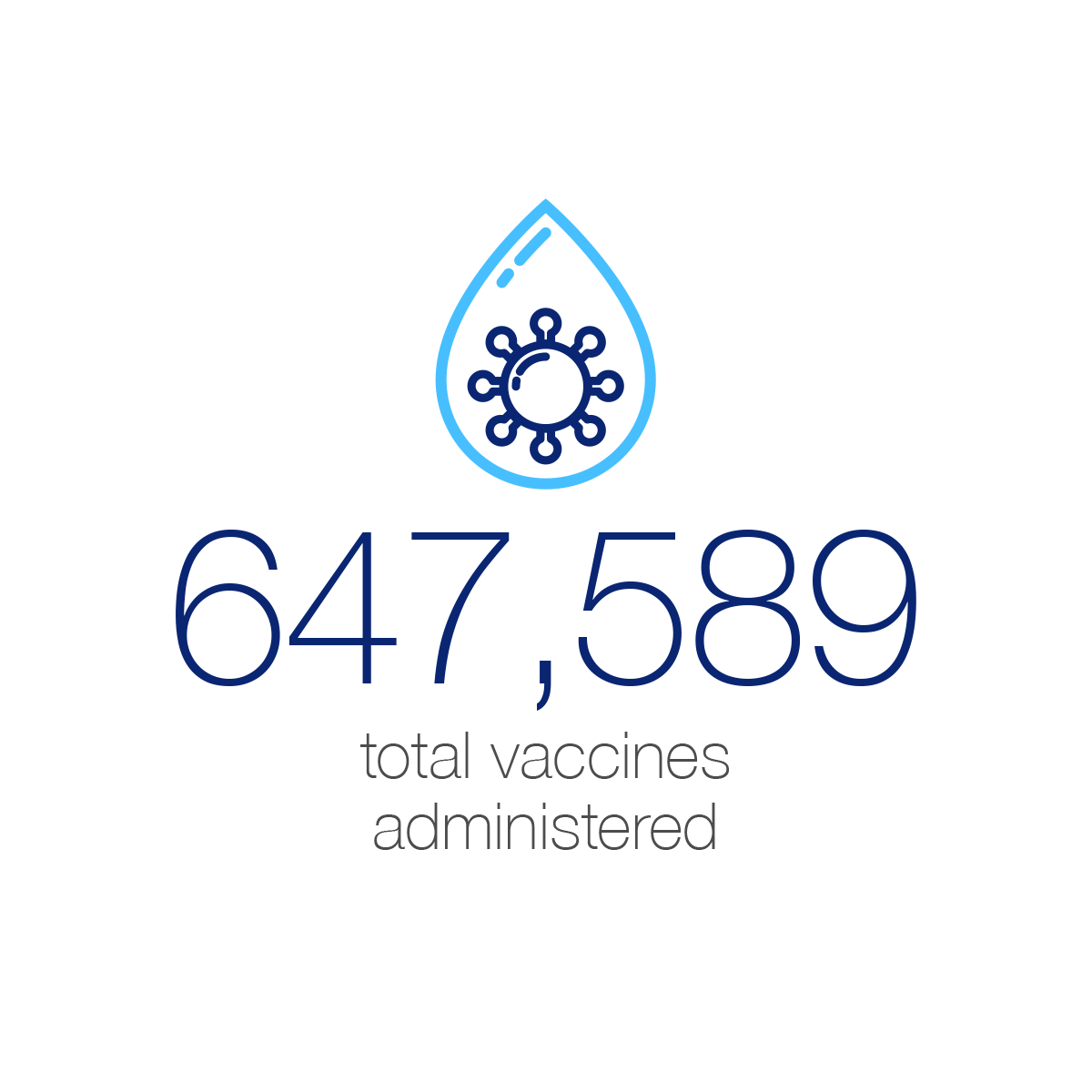

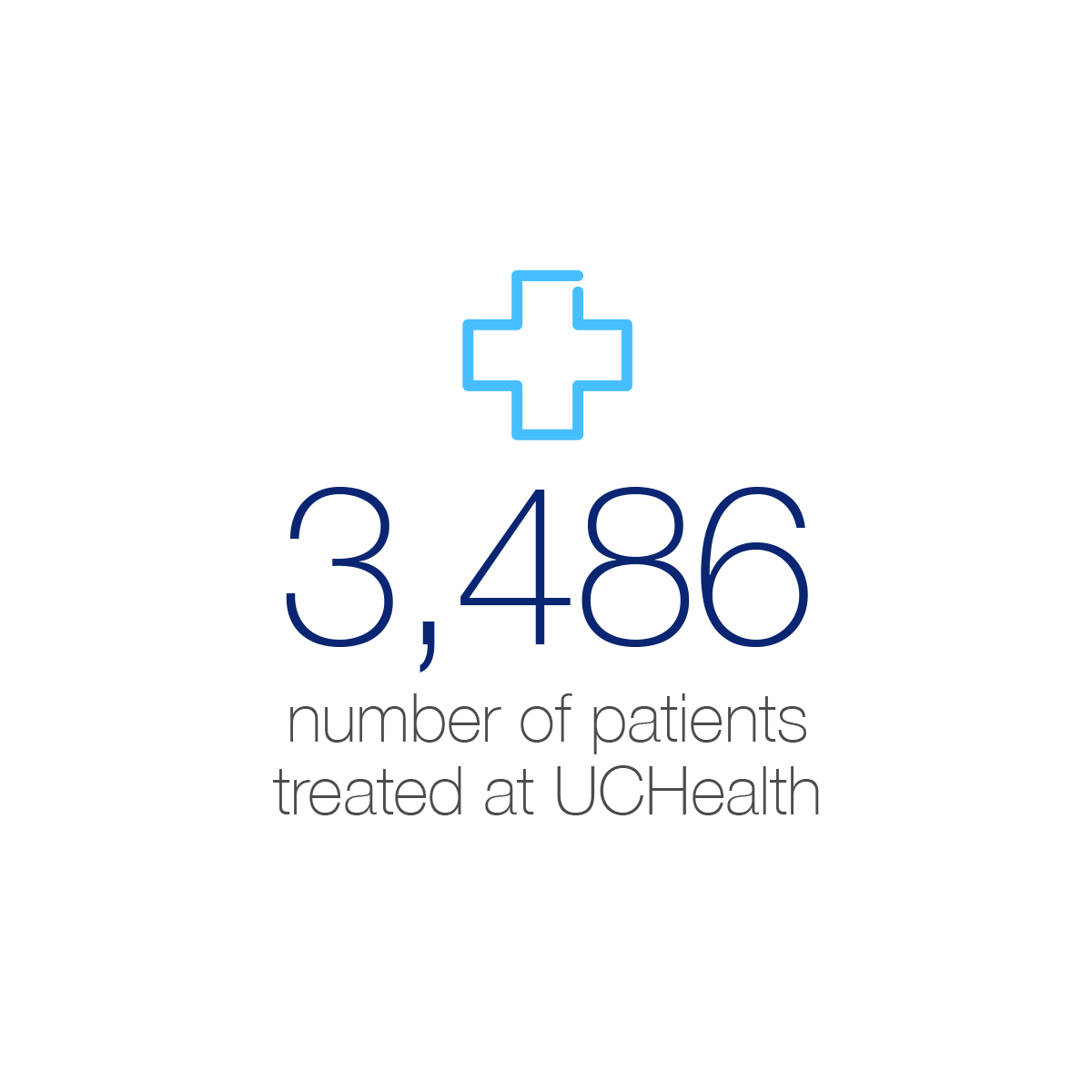
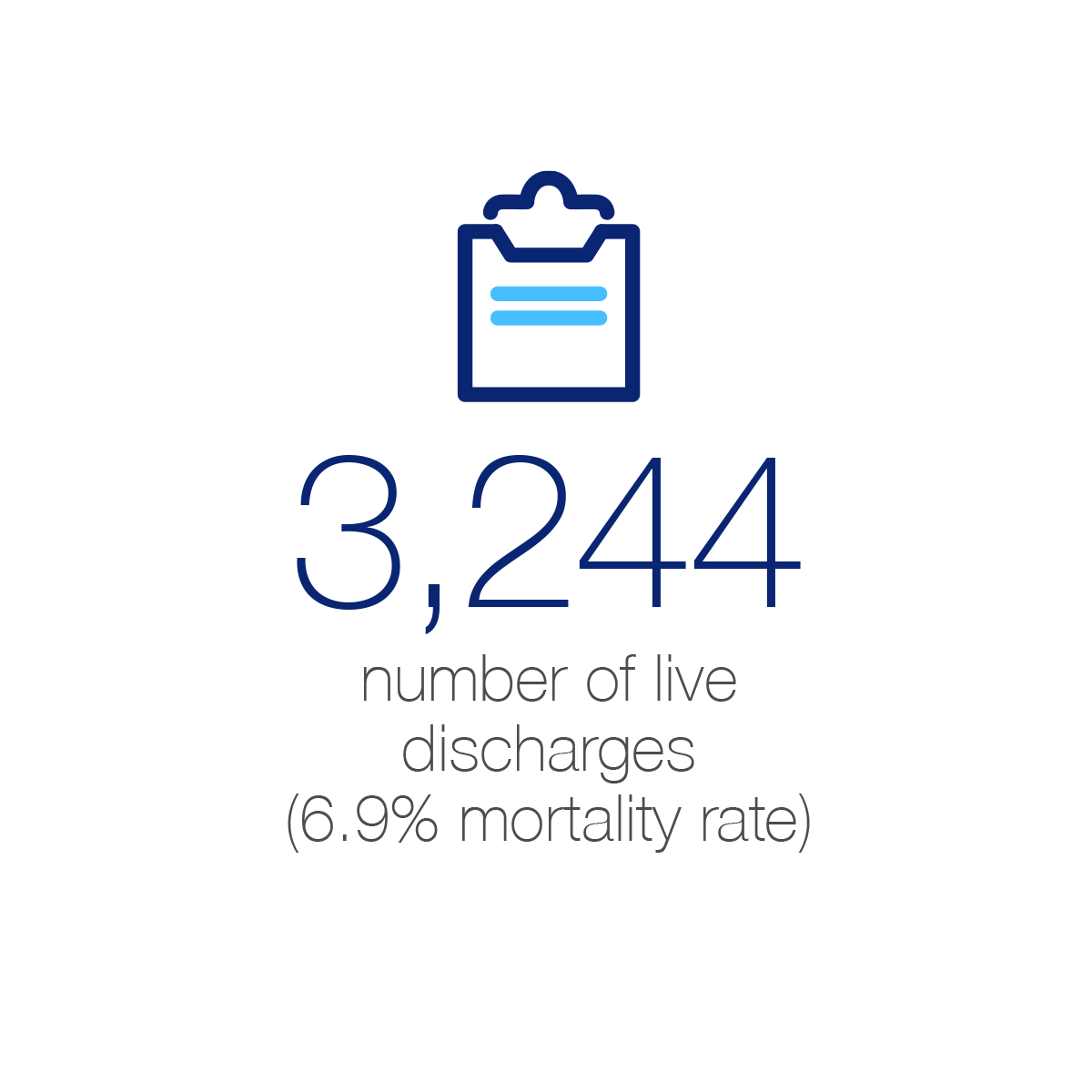

The effective roll out of the COVID-19 vaccine distribution at our facilities would not have been possible without the efforts of Richard Zane, MD, professor and chair of emergency medicine at the CU School of Medicine and chief innovation officer at UCHealth, who oversaw innovation for the hospital system as well as the emergency departments, urgent care centers and virtual health. A master conductor, Zane worked tirelessly with administrators and volunteers to set up vaccine clinics and inoculate thousands of people who came through our doors.

“This [the COVID-19 vaccine distribution] was a Herculean effort by UCHealth and is unequivocally consistent with the commitment UCHealth has to the community and serving the public good,” said Zane.
But it wasn’t just our campus resources that answered the call for help. You – our community supporters – rallied together and gave generously in the fight against COVID-19. The benefactor community mobilized and dug deep beyond our expectation. In fact, many supporters gave outside their typical areas of interest to send funds to our COVID-19 relief efforts. For that, we are eternally grateful.

As longtime supporters of CU Anschutz, the Caruso family was proud to support the campus’ COVID-19 relief efforts and help saves lives. We were moved by the community’s philanthropic response in the wake of the pandemic and wanted to do our part to help. By giving to the COVID-19 Surge Relief Fund, the Emergency Medicine staff at UCHealth received the resources necessary to treat some of the most vulnerable patients affected by COVID-19."
Cindy and Dan Caruso
Benefactors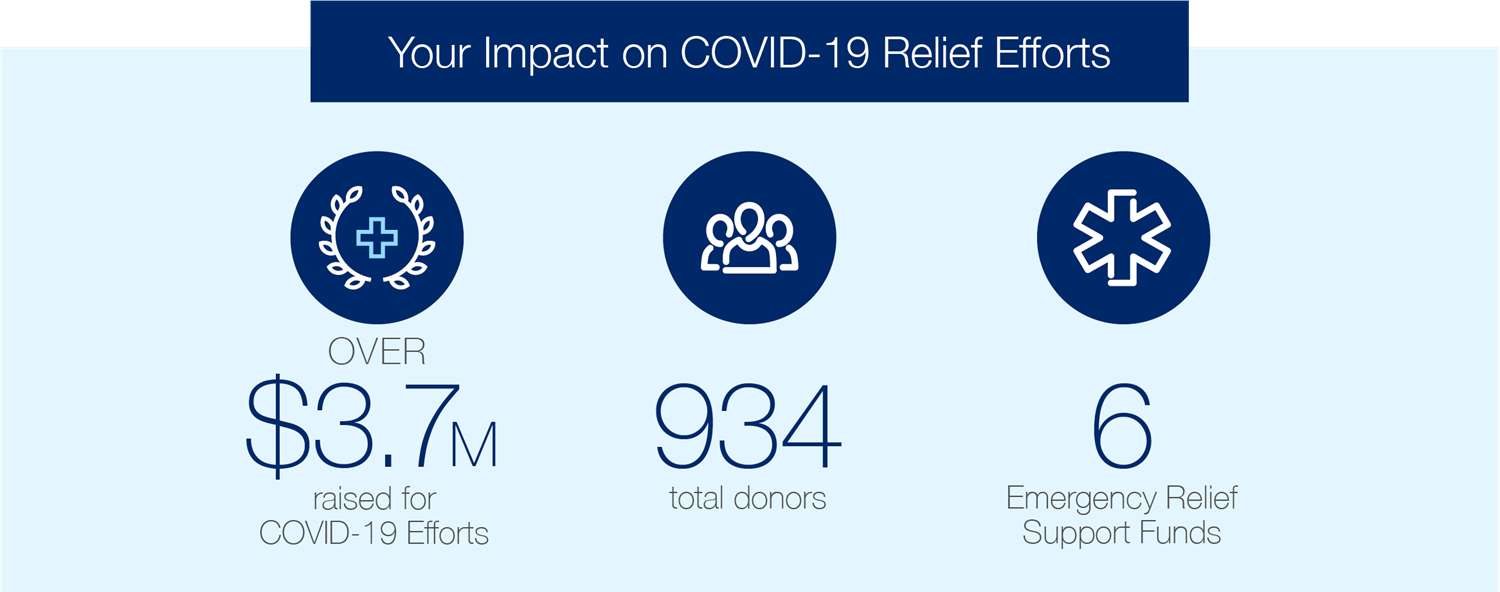




When we say every dollar counts, we mean it. Gifts to the Healthcare Worker Relief Fund (HCWRF) directly aided frontline workers and caregivers at UCHealth who were feeling the emotional, financial and physical stress of the pandemic. To date, 677 employees benefited from the HCWRF to support daycare, housing, utility bills and vital needs impacted by COVID-19.
But that’s not all. We also expanded the use of mental health resources to caregivers during the COVID-19 crisis. Portions of the HCWRF were allocated for the establishment of the Virtual Emotional Wellness Center for all UCHealth medical staff members and employees. This included a dedicated phone number to First Call, a 24/7 virtual emotional, crisis and counseling support center.

For several years now, I’ve known that I need to see a therapist or counselor. My anxiety was gradually getting worse, and I didn’t have the tactics to handle the stress of my job. I felt that I didn’t have the time to find a mental health professional that was covered by insurance, had open appointments, and I could meet with outside of my workday. It was also daunting to know I may have to talk to several professionals before finding the right one for me. Finally, I made the leap and used First Call. I was able to see a licensed professional counselor within three business days. The process was so easy, it made me wish I had reached out months ago. After two appointments, I felt so much better. I hope others have a positive mental health experience like I did! Thank you to the entire team who helped set up First Call."
Anonymous
Participant in the Virtual Emotional Wellness Center





When our nation faces a crisis, your support means more than ever. With your help, we strengthened our ability to respond to a worldwide health pandemic and provide world-class care to our community. While there is still so much work to be done, we know that we are looking at a brighter tomorrow.

CU Anschutz Fund for Excellence
To provide a flexible funding source to address CU Anschutz's most promising priorities in support of research, education and patient care.